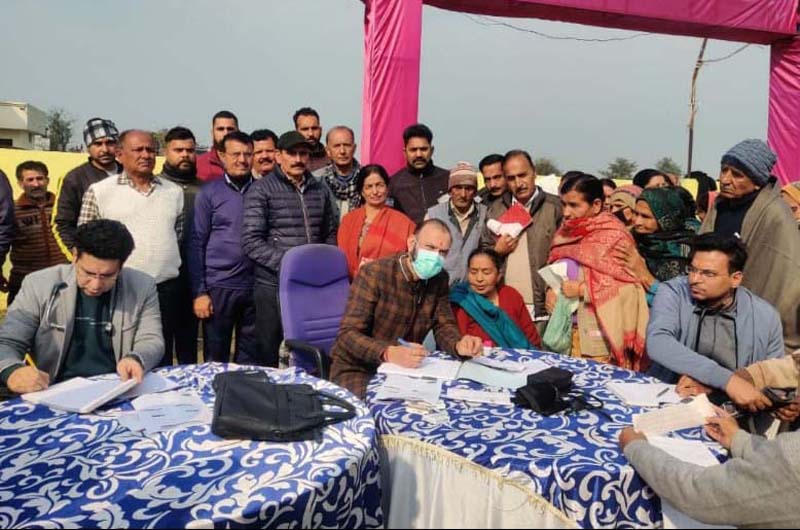Excelsior Correspondent
JAMMU, Jan 22: With rise in substance abuse among both adult and younger masses, and need to educate the masses about them, Head Department of Cardiology SSH Jammu Dr Sushil Sharma organized a day long cardiac awareness-cum-health checkup camp at Amisha Palace, Badyal Brahmana area of R S Pura, Jammu where people were educated about the rising prevalence of substance abuse related cardiovascular diseases and ways to overcome it. More than 400 people were screened; evaluated, diagnosed and free medicines were given as per the requirements.
While Interacting with the people, Dr Sushil stated that drug dependence is a social problem worldwide, and the physical implications are serious. “Many of these drugs cause cerebrovascular and cardiovascular diseases, which often require emergency medical treatment. Differential diagnosis is essential because of the likelihood of life-threatening events, especially among young people who exhibit cerebrovascular and cardiovascular diseases without any of the typical risk factors. Drugs of abuse, especially stimulants, induce a hyper adrenergic state that evokes vasoconstriction and tachycardia, as well as subsequent ischemic and hemorrhagic stroke, acute coronary syndrome, arrhythmias, and aortic dissection. The more prominent drugs associated with cardiovascular disease are the stimulants and opioid drugs. These may increase the risk of vascular and/or heart disorders by disrupting the balance of certain neurotransmitters, called catecholamines, in the body and brain. This may lead to dose dependent changes in blood pressure, abnormalities in the normal rhythms of the heart or blood vessels, increased blood clotting and increased arterial plaque formation,” Dr Sharma said.
He further maintained that many drugs, such as cocaine, heroin and various forms of amphetamine, affect the central nervous system and can alter a user’s consciousness. In addition to addiction, the side effects and risks associated with use of these drugs include: changes in body temperature, heart rate, and blood pressure, headaches, abdominal pain, and nausea, impaired judgment and greater risk of some sexually transmitted infections, the possibility of added substances (such as talc, poisons, herbicides or other particles) which may cause a toxic reaction, heart attacks, seizures, and respiratory arrest. Even so-called recreational cocaine users may have higher blood pressure, stiffer arteries and thicker heart muscle walls than non-users all of which can cause a heart attack, he said.
Others who were part of this camp include Dr Yashwant Singh and Dr Sunny Raina. Paramedics and volunteers include Raghav Rajput, Kamal Sharma, Rajkumar, Gourav Sharma, Sandeep Pal, Mukesh Kumar, Maninder Singh, Rajinder Singh, Amandeep Singh, Gourav Sharma, Vijay Sharma, Subhash Sharma, Vikas Kumar, Suresh Raina and Manoj Kumar.


